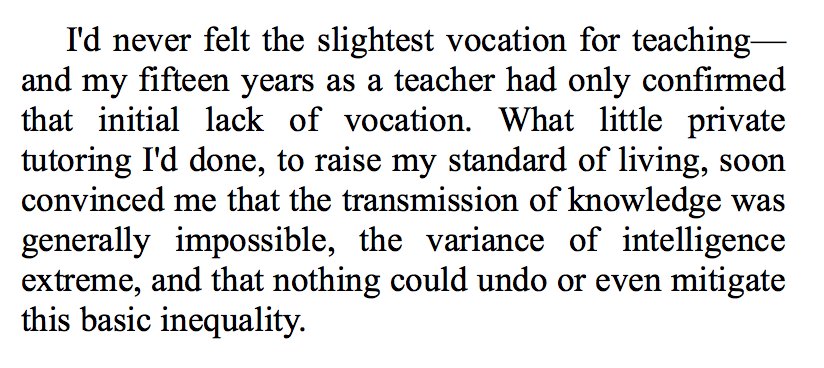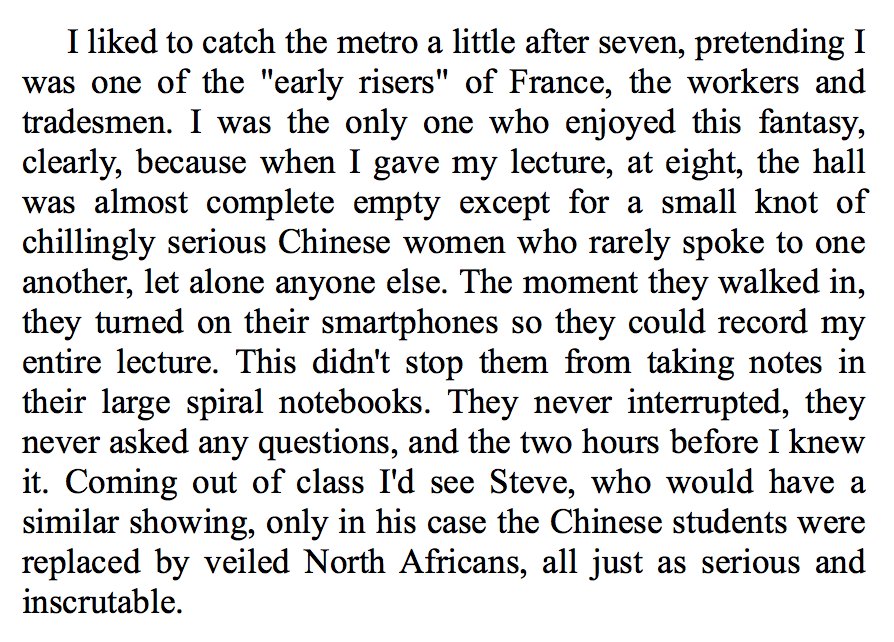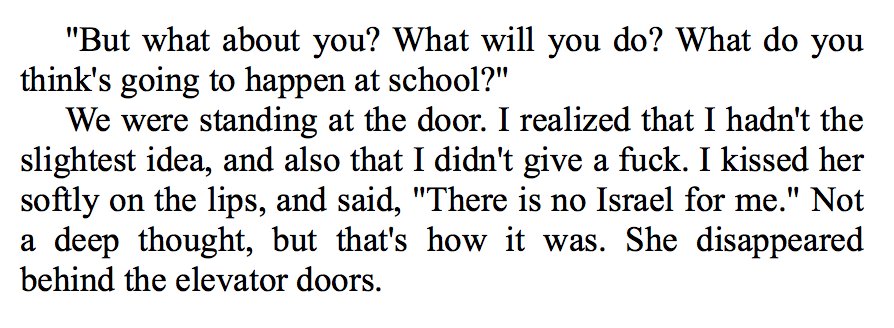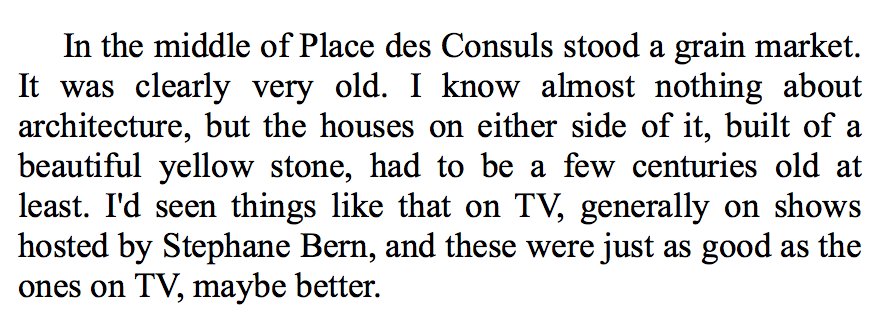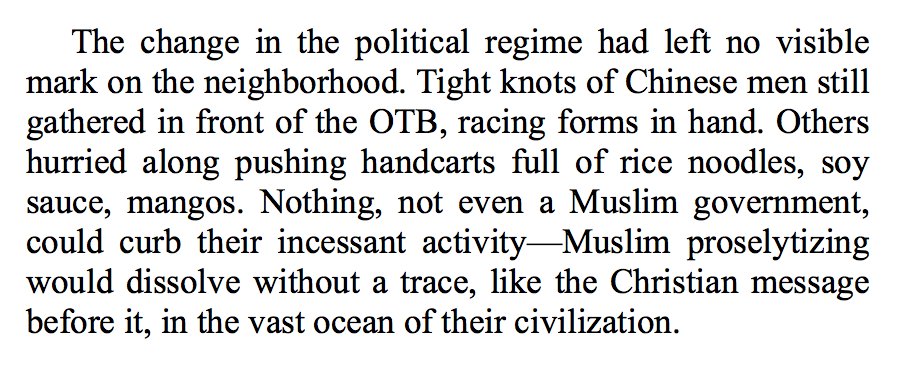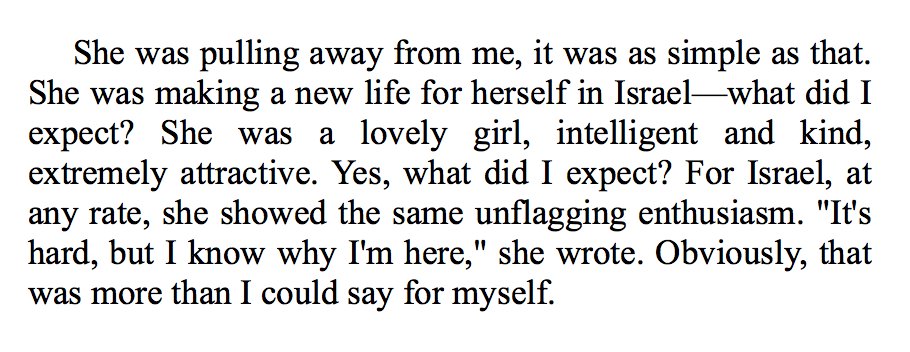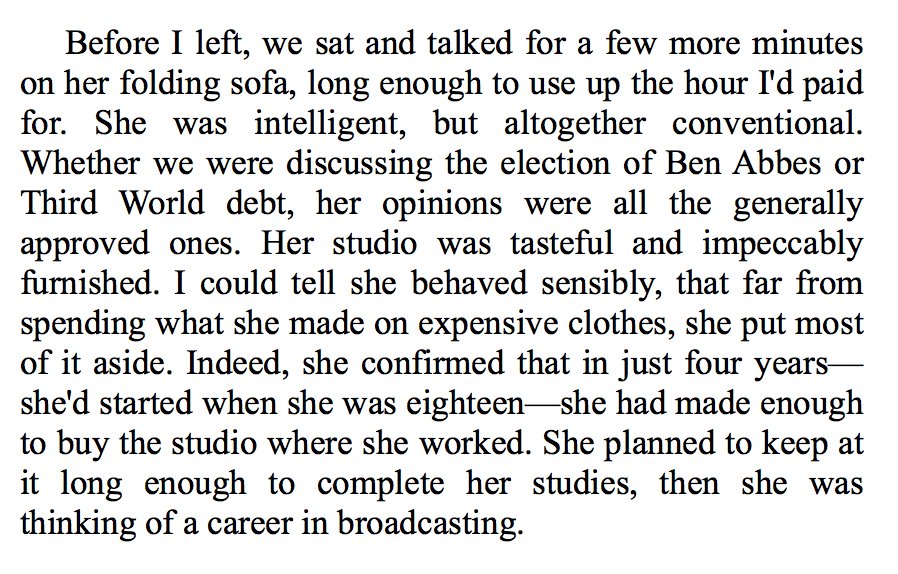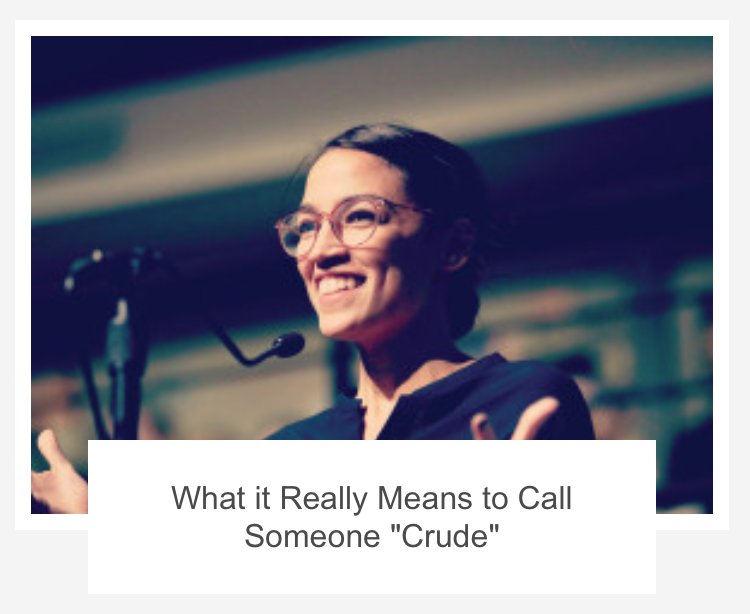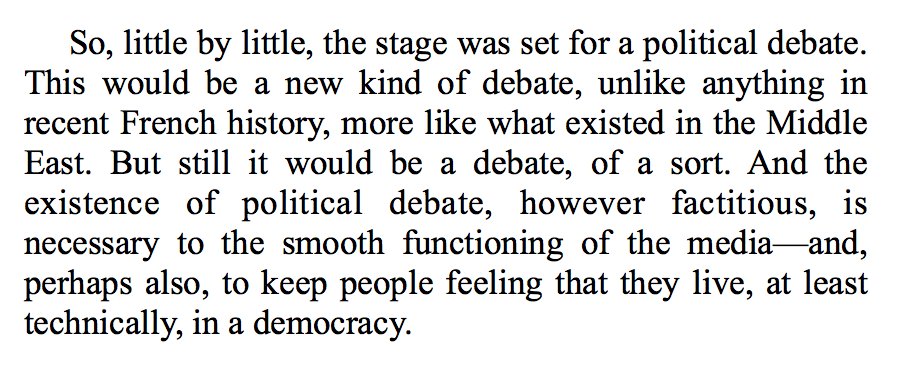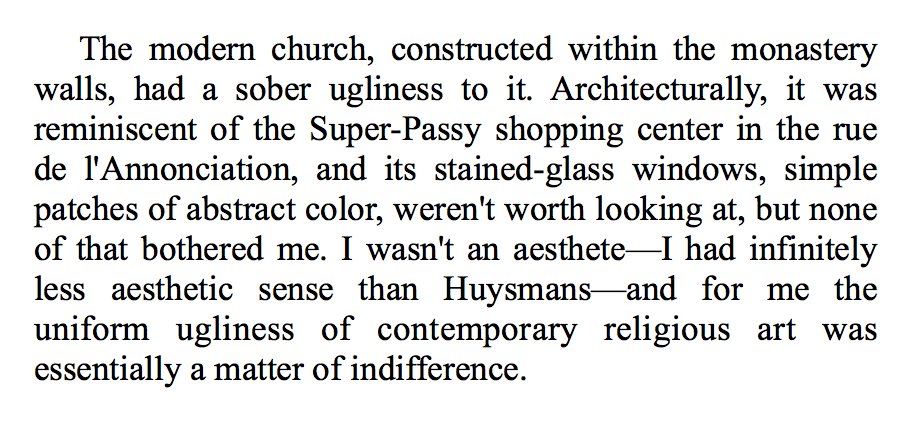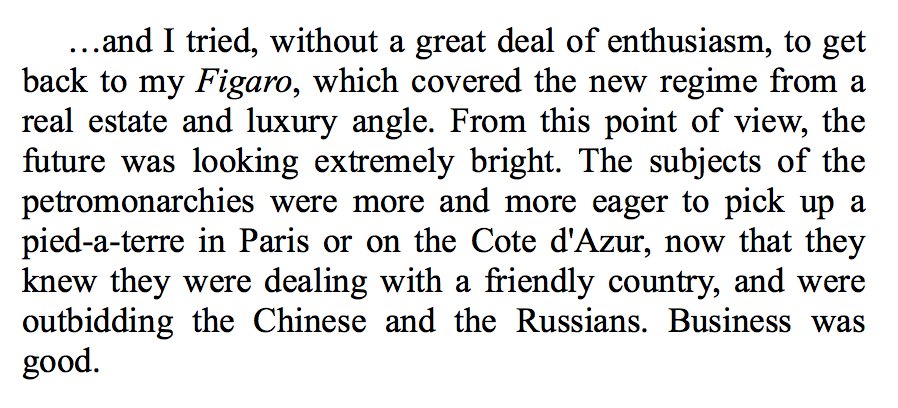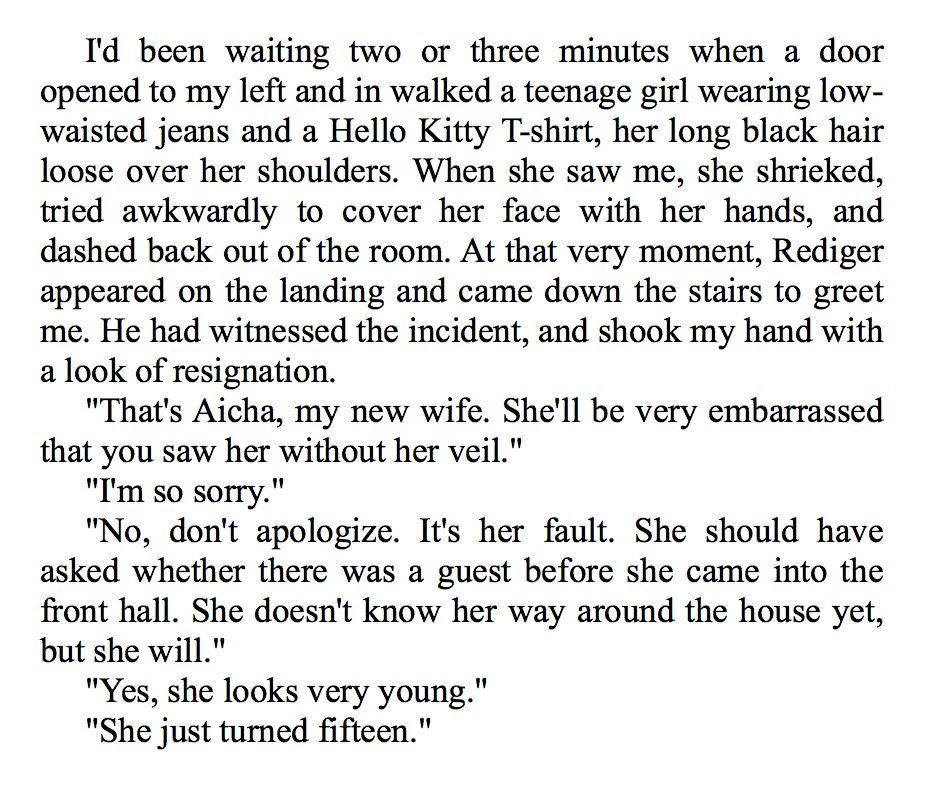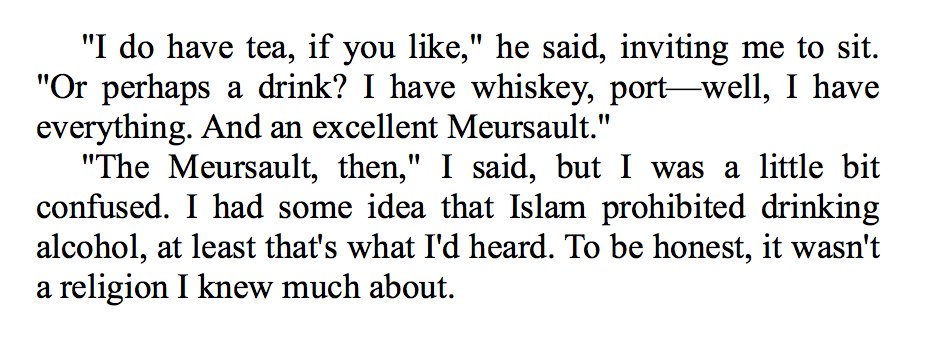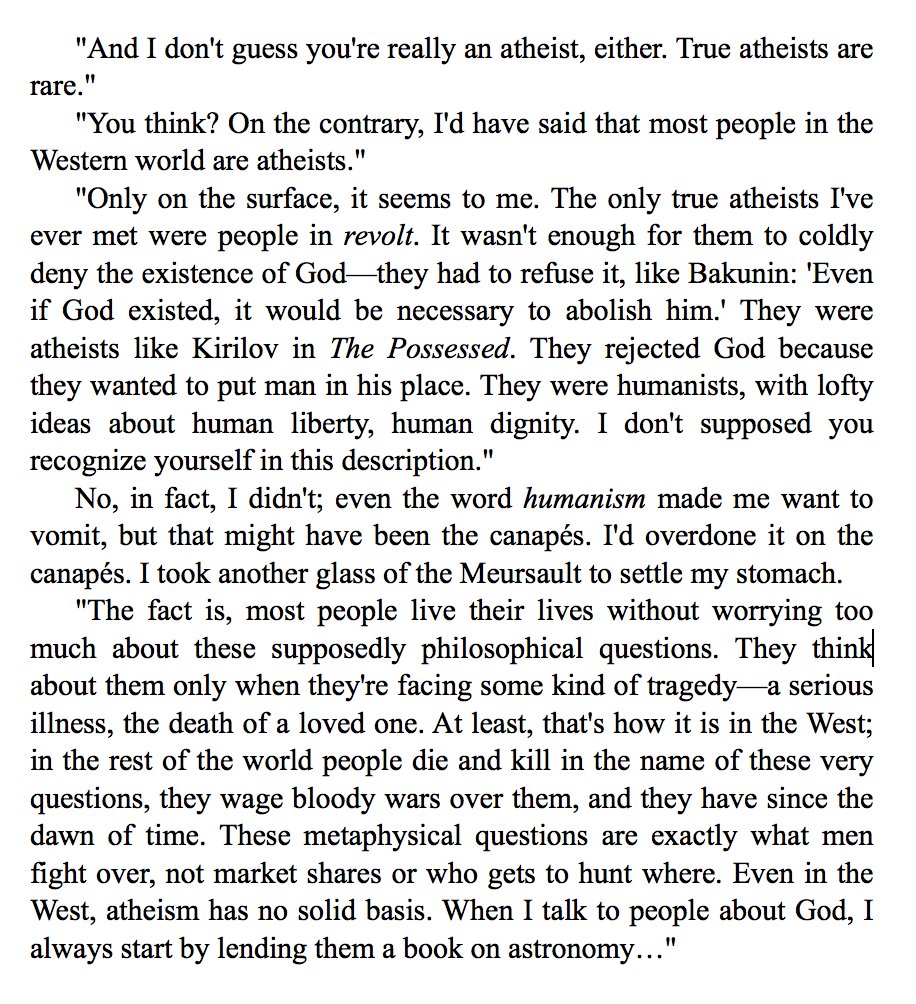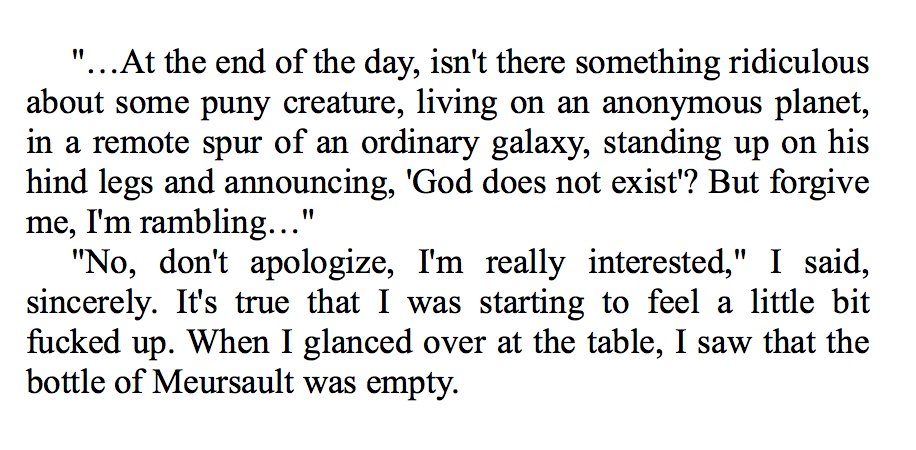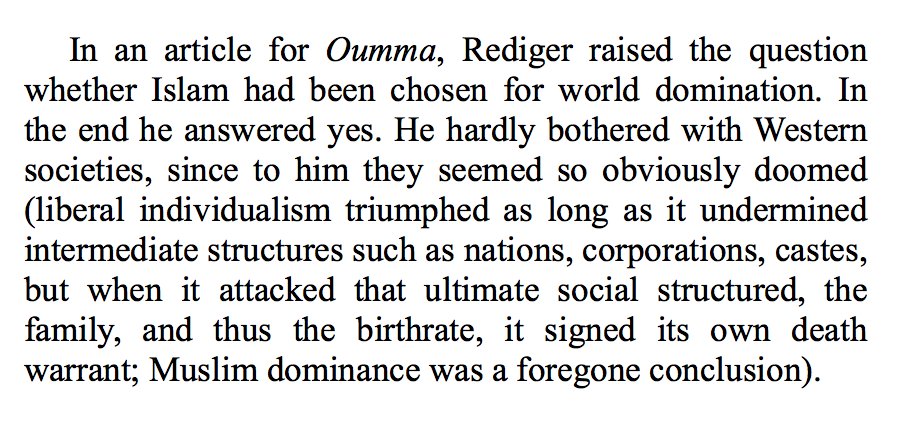Just got my first Houellebecq, SUBMISSION, so probably won't start a new old book for a bit
Fortunately he's a lazy Frenchman and the whole thing isn't 250 pages
Can already see why our side likes him. From his narrator:
Fortunately he's a lazy Frenchman and the whole thing isn't 250 pages
Can already see why our side likes him. From his narrator:
Already very funny, even in translation (this can be hard), and has a ruthless eye toward his narrator (and everything else). Good signs
Also something clearly different in his attitude—easy to just pattern-match it to "French lol," but it seems true
Also something clearly different in his attitude—easy to just pattern-match it to "French lol," but it seems true
French are similar enough to be easily understood, but different enough to be surprising, even dismaying to the American mind.
It's hard to believe this is entirely cultural. On some deeper level, we're just different.
It's hard to believe this is entirely cultural. On some deeper level, we're just different.
lol, Houellebecq immediately makes the same point, compressing three examples into one page. As soon as his (French) narrator reaches full professor, he collapses all his lectures into one day.
As he teaches second-year students literature, Steve teaches first-years:
As he teaches second-year students literature, Steve teaches first-years:
This was published in 2015, meaning it was written sometime between 2011-2014, but he nails the 2017 election:
"It will be just like 2017, the National Front will make it into the runoffs and the left will be voted back in."
NF was starting to rise but far from a safe bet!
"It will be just like 2017, the National Front will make it into the runoffs and the left will be voted back in."
NF was starting to rise but far from a safe bet!
Meanwhile, a thread from @CassiusYoutube on SUBMISSION and its demographic-religious politics https://twitter.com/CassiusYoutube/status/1084641880070127616
Houellebecq is nailing it here: unrest on the rise in France, but center-left papers don't want to cover it, and the "Cassandras" (aka doomsayers) consider it a lost cause
Revolution's coming, but half are blind to it, and the other half is silent, too used to being ignored
Revolution's coming, but half are blind to it, and the other half is silent, too used to being ignored
He's also slipped in a lot of clever details about the loss of French culture. No one eats French food—the best cuisine in the West—and instead eats microwave Indian food, or goes out to Moroccan restaurants
A culture that no longer understands what was valuable about itself.
A culture that no longer understands what was valuable about itself.
Interesting + subtle bit: in the early chapters, when liberalism is going on about its dull ways, and the narrator has consigned himself to death, none of the chapters are marked.
As soon as the Muslim Brotherhood emerges in politics, each chapter is dated.
History has resumed.
As soon as the Muslim Brotherhood emerges in politics, each chapter is dated.
History has resumed.
After a short chronicle of the struggles of a friend's modern marriage:
"Bruno and Annelise must be divorced by now. That's how it goes nowadays. A century ago, in Huysmans's time, they would have stayed together, and maybe they wouldn't have been so unhappy after all."
"Bruno and Annelise must be divorced by now. That's how it goes nowadays. A century ago, in Huysmans's time, they would have stayed together, and maybe they wouldn't have been so unhappy after all."
Remarkable scene: France is about to elect the National Front, the hard right. Our leftist narrator is troubled. His mistress is a Jewish student half his age. Her parents are fleeing to Israel to escape the nationalist uprising
They're both disturbed about the future. She asks:
They're both disturbed about the future. She asks:
This scene is tragic on a level that's hard to convey:
The France he knew, no matter how dissatisfied his life is because of it, is about to be swept away, changed immutably by the clash of progress, forever. And there is no other France for him to escape to.
The France he knew, no matter how dissatisfied his life is because of it, is about to be swept away, changed immutably by the clash of progress, forever. And there is no other France for him to escape to.
There is a funny bit, now, where he drives out of Paris to escape the unrest, and realizes he knows almost nothing of France outside of the capital.
This is recognizing what would become the gilets jaunes: the struggle between the eight major metro regions + the rest of France
This is recognizing what would become the gilets jaunes: the struggle between the eight major metro regions + the rest of France
To digress:
There is an argument that in France, the protest movement is the result of the struggle between the metros, which control success, and the "rural areas," which have been left behind by globalism—and can't afford cities due to housing-subsidized mass migration
There is an argument that in France, the protest movement is the result of the struggle between the metros, which control success, and the "rural areas," which have been left behind by globalism—and can't afford cities due to housing-subsidized mass migration
This piece gives an immense amount of background on the social struggle taking place in France, both in real life, and as envisioned going forward by Houellebecq
Crucial supplemental material
https://www.city-journal.org/html/french-coming-apart-15125.html
Crucial supplemental material
https://www.city-journal.org/html/french-coming-apart-15125.html
This, when the protagonist escapes from the political turmoil into the countryside, is almost cruelly cutting
Remember this guy is a Parisian intellectual—and only has the vaguest knowledge of his own culture, delivered from TV
Remember this guy is a Parisian intellectual—and only has the vaguest knowledge of his own culture, delivered from TV
It's hard to stress how good he is with details, often the mark of really great fiction. He earlier harped on the stability of an elder relationship where the wife becomes a "good little cook"—and then, as soon as two government friends are fired, the wife becomes just that
This transformation isn't overplayed, either, isn't even directly referenced. It just echoes.
This domesticity also only happens after they're freed of their dual-income liberalism: the husband an intelligence spook, the wife a professor
This domesticity also only happens after they're freed of their dual-income liberalism: the husband an intelligence spook, the wife a professor
So—spoiler alert, although it's in the blurb...the Muslim Brotherhood has won the election.
Protagonist returns to Paris. He lives in Chinatown. Funny to read this in light of the way China's been dealing with their Muslim Uyghurs.
Chinese don't care: they'll always be Chinese
Protagonist returns to Paris. He lives in Chinatown. Funny to read this in light of the way China's been dealing with their Muslim Uyghurs.
Chinese don't care: they'll always be Chinese
After much uncertainty, the outcomes of the election of an Islamic PM are becoming clear
First, they've bought off the academy with oil money. Smart move!
Second, male professors can still sleep with students—but now they're supposed to marry them.
More than one, if they want.
First, they've bought off the academy with oil money. Smart move!
Second, male professors can still sleep with students—but now they're supposed to marry them.
More than one, if they want.
Updating the status of his former student mistress, who fled France during the uncertainty
The virgin liberal vs. the Chad identitarian
The virgin liberal vs. the Chad identitarian
Finding himself cut off from all other sexual opportunity, he hires an escort of Tunisian decent, and then literally sodomizes her—but to his disappointment, she's not even Muslim, but has been secularized by liberalism
This might be his most brutal critique of the West so far
This might be his most brutal critique of the West so far
lmao do his publishers, adoring critics, people who translated for people like me to read, etc., pick up what he's laying down?
Feels like I'm reading pure, unadulterated French samizdat
Feels like I'm reading pure, unadulterated French samizdat
You could spend 5000 words on this paragraph
But I'm just going to talk about how the prostitute's next move is to become a journalist
But I'm just going to talk about how the prostitute's next move is to become a journalist
Narrator's bourgeoise father dies. Learns dad bought lots of guns, hunted:
"An ex-CFO of Unilever buying an off-road SUV and discovering his inner hunter-gatherer"
Same deal with his friends earlier who, as soon as they were freed of neoliberal life, immediately turned trad
"An ex-CFO of Unilever buying an off-road SUV and discovering his inner hunter-gatherer"
Same deal with his friends earlier who, as soon as they were freed of neoliberal life, immediately turned trad
Here's the thing about Houellebecq—he has the most evil talent an artist can possess:
He can hoist his enemies up on a pike to die, but he understands them so well that he can phrase his barbs in ways that they can lead themselves to think he APPROVES of their beliefs
He can hoist his enemies up on a pike to die, but he understands them so well that he can phrase his barbs in ways that they can lead themselves to think he APPROVES of their beliefs
True story: as I looked up "factitious," to make sure it meant what I thought (manufactured, fake), here's the image http://dictionary.com had at the top of its page
Spurred by this passage...
Spurred by this passage...
Now this is interesting: new Muslim president institutes pro-family reforms along Catholic distributionist lines
Islam is now reviving the family—the core of society—in a way the West is incapable of, having abandoned both religion, and marriage itself, to reason + liberalism
Islam is now reviving the family—the core of society—in a way the West is incapable of, having abandoned both religion, and marriage itself, to reason + liberalism
Shocked by his nation's sudden pivot to Islam, our narrator heads to the Christian monastery where his literary hero converted
Houellebecq makes sure to point out this is also the West's oldest monastery
This isn't coincidence, all these details are deliberately chosen
Houellebecq makes sure to point out this is also the West's oldest monastery
This isn't coincidence, all these details are deliberately chosen
Our narrator hasn't been to the monastery in twenty years, since his studies, but the monk instantly remembers him. Narrator has no memory of the monk.
The religious have an understanding of time/history/the past, the liberal exists detached from the significance of all
The religious have an understanding of time/history/the past, the liberal exists detached from the significance of all
The old monastery was forced to give up its church by the state, later had to rebuild a new one inside their remaining grounds.
Houellebecq is now @wrathofgnon-posting
Houellebecq is now @wrathofgnon-posting
But religious life just doesn't connect with our narrator. He takes a train home. As he's seated across from a middle-aged Arab businessman with two twenty-year-old wives, this is what his elites tell him about the glory of his future.
Neoliberalism will never recover from this.
Neoliberalism will never recover from this.
Life under Islamic rule, however, is treating the native French elite quite well. "Aisha" or a variant is the name of one of Muhammad's most important wives btw
She's just a child, but soon she'll learn her place!
She's just a child, but soon she'll learn her place!
I often miss literary references, but this has to be a reference to the protagonist of The Stranger named Meursault, who, in confusion, accidentally shoots and kills a Muslim man, and is condemned to death for it, largely without understanding anything of the events around him
lol he was about to investigate a Rene Guenon work from his friend's bookshelf, but jumped when caught in the act
Don't think I'm overreading the reactionary elements of this book
Don't think I'm overreading the reactionary elements of this book
His friend wants to recruit him to the new Muslim-led university. Which would require our professor to convert to Islam. When the protagonist questions whether that's possible... WEW
Modern West: no true principles, divorced from the real motivations of man
Modern West: no true principles, divorced from the real motivations of man
His friend, to attempt to convert him, gives a long speech about the scope of the universe + all the genius scientific minds (Newton, Einstein) who believed in God despite their intelligence.
At the end of his exhortation, the Meursault—i.e. existentialism—is completely empty.
At the end of his exhortation, the Meursault—i.e. existentialism—is completely empty.
The narrator's friend, a Frenchman turned apologist for the new Muslim regime, describing to his fellow French why their time is over, and it's time to turn Europe, exhausted by liberalism, over to Islam.
(He predicts the same for China and India, though it's more speculative.)
(He predicts the same for China and India, though it's more speculative.)
In the home stretch now. Not really a lot of spoilers to be had plot-wise, but I'll be avoiding close passage stuff unless something really leaps out.
Generally, narrator's trying to synthesize understanding between himself, his long-dead literary idol, and his/France's future
Generally, narrator's trying to synthesize understanding between himself, his long-dead literary idol, and his/France's future
Just hit the end. Lands with a punch.
Immediate impression: I liked this a lot. Highly readable, great translation, you could read it in a day or two, but a lot of depth, and I'm sure I missed plenty more.
Will definitely read more of his.
Immediate impression: I liked this a lot. Highly readable, great translation, you could read it in a day or two, but a lot of depth, and I'm sure I missed plenty more.
Will definitely read more of his.
Nice insight into the French mind while also being universal enough to speak to the general West. Which is to say: liberalism is a dead end, a bottle of wine that was intoxicating in the moment, but which is now empty.
Now it's time for the hangover.
Now it's time for the hangover.
The story in SUBMISSION is that we're too far removed from our own past, however much we might love it, to revive it for answers.
Something else must follow. Maybe Islam, as Houellebecq suggests. But there are other options, too.
Depends on who has the will to seize them.
Something else must follow. Maybe Islam, as Houellebecq suggests. But there are other options, too.
Depends on who has the will to seize them.

 Read on Twitter
Read on Twitter